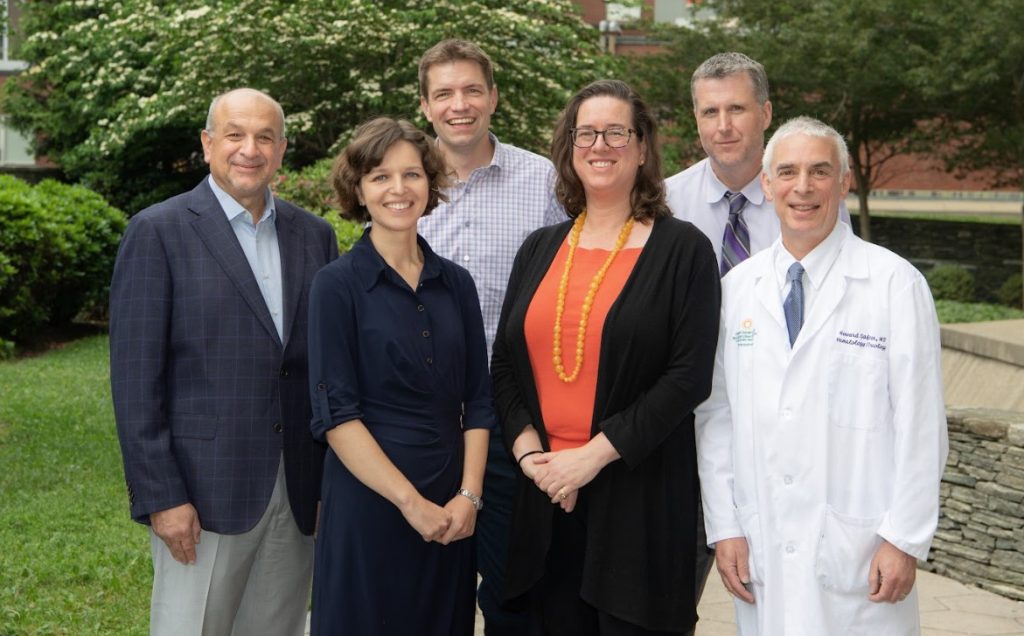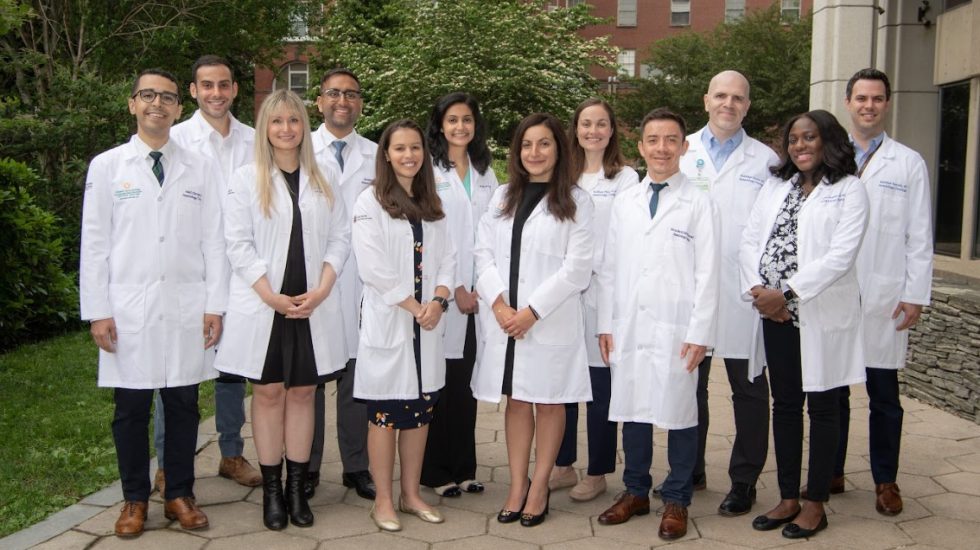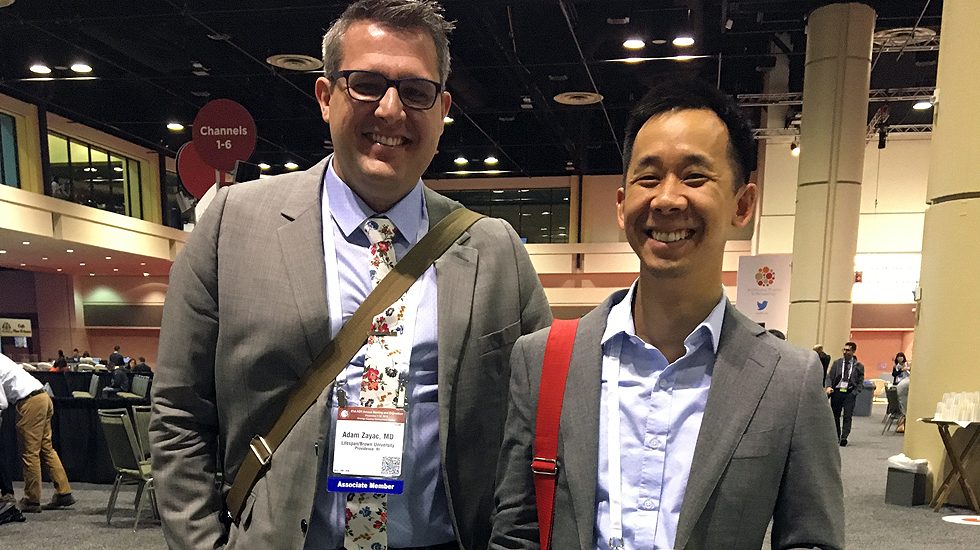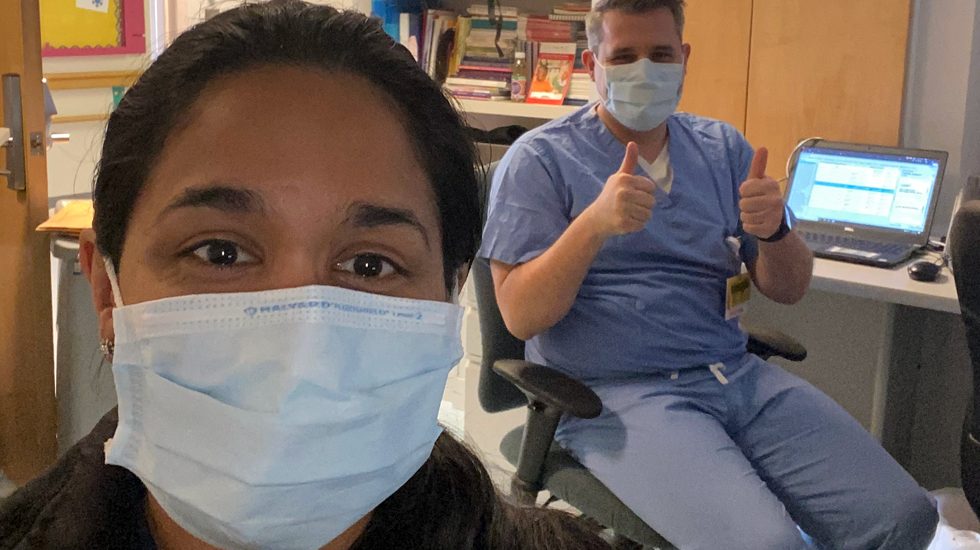Hematology/Oncology – Fellowship Program
From the Fellowship Directors:
Welcome to the Brown Medical School Hematology-Oncology Fellowship website. You will find descriptions of the training program, the participating hospitals, and research opportunities below.
This website will introduce you to our program and will describe our two-fold mission:
- To provide excellent training in clinical Hematology and Oncology
- To provide outstanding research opportunities
Graduating fellows are well equipped to pursue scholarly academic careers and for the challenges of clinical practice in Hematology and Medical Oncology.
There is a full schedule of clinical, educational, and research conferences. Hematology Oncology Grand Rounds is a weekly state of the art conference by fellows, Brown faculty, and visiting faculty. Other educational conferences include weekly Morning Report (clinical management of challenging cases), monthly Hematopathology Conference, monthly Hemostasis Conference, and others. Fellows and faculty discuss current literature in the monthly Journal Club. Each hospital has its own schedule of Tumor Boards and other teaching conferences.
Each fellow has an outpatient clinic at one of the participating hospitals, in which he or she follows a group of patients throughout the fellowship. Additional outpatient clinics, including specialty clinics, are scheduled in the latter years of the fellowship.
Approximately one half of recent trainees have entered academic careers, but others have pursued advanced training in stem cell transplantation, entered private practice, or worked in the pharmaceutical industry.
Thank you for your interest in the Brown University Hematology-Oncology Fellowship. We look forward to hearing from you.
Regards,
Anthony Mega, MD
Matthew Quesenberry, MD
Thomas Ollila, MD
Sabrina Witherby, MD
Galina Lagos, MD

Mission
The Hematology-Oncology Fellowship Training Program at Brown University will be devoted to the rigorous training and development of physician scientists to become future leaders in clinical and/or laboratory investigation.
Goals
The Brown University Hematology-Oncology Fellowship Training Program will provide rigorous and comprehensive training in:
- The prevention, detection, evaluation and care of cancer patients, and in the evaluation and treatment of patients with benign hematologic disorders, leading to board eligibility in medical oncology and/or hematology.
- Clinical and translational research including trial design and methodology, biostatistics and ethics.
- Laboratory-based research to develop highly productive investigators.
Core Curriculum and Didactics
The core curriculum is developed to provide comprehensive training in cancer biology, clinical oncology and hematology, and fundamentals of clinical research, including:
- Epidemiology, prevention, diagnosis and treatment of all major malignancies
- Biology and treatment of benign hematologic conditions
- Cancer Medicine: pharmacology, supportive care, general care, ethics of caring for cancer patients
- Clinical Research Methods: clinical research methodology, biostatistics, ethics of clinical research (Specific research curriculum and topics will be developed for the first 12 months of the fellowship)
- Cancer Biology: pathophysiology, molecular biology
- Career Development: workshops in grant writing, manuscript preparation, CV preparation, and developing a career in clinical and laboratory research.
Clinical Rotations
The program uses the facilities and faculty of four Brown Medical School teaching hospitals: Rhode Island Hospital, The Miriam Hospital, and the Providence Veterans Administration Hospital. Fellows gain a broad perspective in hematology and oncology by working closely with the faculty, the diverse patient populations, and the clinical and laboratory research at the various hospitals. Additional rotations include the bone marrow transplant unit at the Dana Farber Cancer Institute and elective rotations in radiation oncology, pediatric hematology/oncology, gynecologic oncology, hematopathology, blood banking, and others.
- Rhode Island Hospital Inpatient Service
- Rhode Island Hospital Consult Service
- The Miriam Hospital
- Providence Veterans Affairs Medical Center
- Bone Marrow Transplant (Dana Farber Cancer Institute)
- Elective Rotations
Outpatient Rotations
Fellows participate in two outpatient clinic sessions per week. Fellows will generally have a continuity clinic and a specialty clinic.
Current oncology/malignant hematology clinics include:
- Breast oncology
- Genitourinary oncology
- Gastrointestinal oncology
- Gynecologic oncology
- Head and Neck Oncology
- Leukemia/Lymphoma
- Melanoma and Cutaneous Malignancies
- Neuro-oncology
- Thoracic oncology
Each clinical program stresses the integration of clinical and laboratory research with clinical care. Presentations of both clinical and laboratory research will be emphasized at divisional and clinical program conferences.
Patients with hemophilia, thoracic malignancies, breast, melanoma, and genitourinary malignancies are seen in multidisciplinary clinics. In these settings, patients can be seen by their hematologist/oncologist, surgeons, social workers, and nurses in an efficient coordinated setting.
Research Training
Fellows may perform laboratory or clinical research. In the first year of fellowship, each fellow is assigned an advisor who helps the fellow focus research interests and assists in the selection of mentors for the research phase of training. Faculty mentors are independent clinical and/or laboratory investigators with proven records of accomplishment. By the end of the first year, each fellow and mentor are expected to prepare a research proposal outlining either a laboratory research project and training program or a clinical research project outlining the design and conduct of a clinical trial. During the research phase of the training, fellow funding is derived from contract and grant revenue that is supplemented by institutional sources as necessary.
Clinical Research Training
During the research training period, the mentor will be responsible for meeting regularly with the fellow to insure that a focused and testable hypothesis is developed. A Cancer Center Statistician will work with the fellow in the development of a protocol. The mentor is responsible for oversight of trial design and conduct, regulatory requirements, data collection analysis and interpretation, culminating in the presentation of research and manuscript preparation. Collaboration with multi-disciplinary research teams including basic scientists, statisticians and other clinician-scientists will be an integral part of this process. During this period, the fellow will maintain focused clinical activity in the appropriate subspecialty clinic(s), receiving ongoing clinical training as well as training in protocol maintenance and accrual, regulatory, and ethical issues in research. This practical experience will be complemented with formal coursework in clinical research methodology.
Laboratory Research Training
All laboratory research fellows will continue to attend one half-day outpatient session per week related to patient care. This will allow the fellow to devote the required time to laboratory investigation while maintaining clinical skills. Fellows attend selected conferences to interact with other fellows, investigators, and distinguished scientists from other institutions. Informal presentations of research will occur regularly.
How to Apply
Applications are accepted through the Electronic Residency Application Service (ERAS). Selected applicants will be invited for an interview. The program participates in the Medical Specialties Match Program (MSMP) of the National Residency Match Program (NRMP).
For additional information regarding the application process, please click here.
Contact Information
Valerie Perez
Fellowship Training Program Coordinator
Alpert Medical School of Brown University
Rhode Island Hospital, George 312
593 Eddy Street
Providence, RI 02903
Phone: 401-444-9375
Fax: 401-444-2330
Email: vperez2@Lifespan.org
About Us
The Department of Medicine at Alpert Medical School is comprised of eleven distinct Divisions. These Divisions, working in conjunction with the community doctors who comprise our Primary Care offerings, provide patients with an outstanding level of care both within the Brown affiliated hospitals and throughout several community-based clinical locations. In addition to patient services, several of our Divisions offer exceptional programs for Residents and Fellows within their designated areas of expertise.
How To Reach Us
Office of the Physician-in-Chief
Louis B. Rice, MD
593 Eddy Street
Providence, RI 02903
Louis B. Rice, MD
593 Eddy Street
Providence, RI 02903



